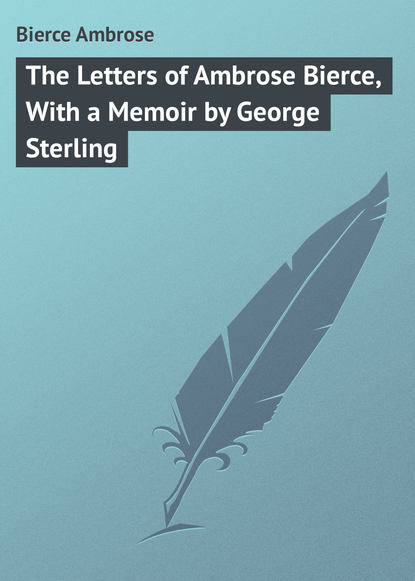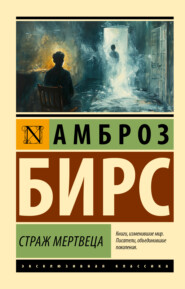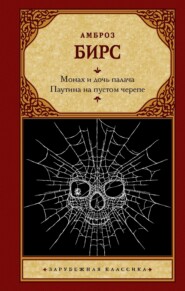По всем вопросам обращайтесь на: info@litportal.ru
(©) 2003-2025.
✖
The Letters of Ambrose Bierce, With a Memoir by George Sterling
Настройки чтения
Размер шрифта
Высота строк
Поля
* * *
In your character of bookseller carrying a stock of my books you have a new interest. May Heaven promote you to publisher!
Thank you for the Moody books – which I'll return soon. "The Masque of Judgment" has some great work in its final pages – quite as great as anything in Faust. The passages that you marked are good too, but some of them barely miss being entirely satisfying. It would trouble you to find many such passages in the other book, which is, moreover, not distinguished for clarity. I found myself frequently prompted to ask the author: "What the devil are you driving at?"
I'm going to finish this letter at home where there is less talk of the relative military strength of Japan and San Francisco and the latter power's newest and most grievous affliction, Teddy Roosevelt.
Ambrose Bierce.
P.S. Guess the letter is finished.
The Army and
Navy Club,
Washington, D. C.,
January 27,
1907.
Dear George,
I suppose I owe you letters and letters – but you don't particularly like to write letters yourself, so you'll understand.
* * *
Hanging before me is a water-color of a bit of Carmel Beach, by Chris Jorgensen, for which I blew in fifty dollars the other day. He had a fine exhibition of his Californian work here. I wanted to buy it all, but compromised with my desire by buying what I could. The picture has a sentimental value to me, apart from its artistic.
* * *
I am to see Neale in a few days and shall try to learn definitely when his magazine is to come out – if he knows. If he does not I'll withdraw your poem. Next month he is to republish "The Monk and the Hangman's Daughter," with a new preface which somebody will not relish. I'll send you a copy. The Howes book is on its travels among the publishers, and so, doubtless, will long continue.
Sincerely yours, Ambrose Bierce.
The Army and
Navy Club,
Washington, D. C.,
February 5,
1907.
Dear George,
Our letters "crossed" – a thing that "happens" oftener than not in my correspondence, when neither person has written for a long time. I have drawn some interesting inferences from this fact, but have no time now to state them. Indeed, I have no time to do anything but send you the stuff on the battle of Shiloh concerning which you inquire.
I should write it a little differently now, but it may entertain you as it is.
* * *
Sincerely yours, Ambrose Bierce.
* * *
Washington,
February 21,
1907
My dear George,
If you desert Carmel I shall destroy my Jorgensen picture, build a bungalow in the Catskills and cut out California forever. (Those are the footprints of my damned canary, who will neither write himself nor let me write. Just now he is perched on my shoulder, awaiting the command to sing – then he will deafen me with a song without sense. O he's a poet all right.)
I entirely approve your allegiance to Mammon. If I'd had brains enough to make a decision like that I could now, at 65, have the leisure to make a good book or two before I go to the waste-dump. * * * Get yourself a fat bank account – there's no such friend as a bank account, and the greatest book is a check-book; "You may lay to that!" as one of Stevenson's pirates puts it.
* * *
No, sir, your boss will not bring you East next June; or if he does you will not come to Washington. How do I know? I don't know how I know, but concerning all (and they are many) who were to come from California to see me I have never once failed in my forecast of their coming or not coming. Even in the case of * * *, although I wrote to you, and to her, as if I expected her, I said to one of my friends: "She will not come." I don't think it's a gift of divination – it just happens, somehow. Yours is not a very good example, for you have not said you were coming, "sure."
So your colony of high-brows is re-establishing itself at the old stand – Piedmont. * * * But Piedmont – it must be in the heart of Oakland. I could no longer shoot rabbits in the gulch back of it and sleep under a tree to shoot more in the morning. Nor could I traverse that long ridge with various girls. I dare say there's a boulevard running the length of it,
"A palace and a prison on each hand."
If I could stop you from reading that volume of old "Argonauts" I'd do so, but I suppose an injunction would not "lie." Yes, I was a slovenly writer in those days, though enough better than my neighbors to have attracted my own attention. My knowledge of English was imperfect "a whole lot." Indeed, my intellectual status (whatever it may be, and God knows it's enough to make me blush) was of slow growth – as was my moral. I mean, I had not literary sincerity.
Yes, I wrote of Swinburne the distasteful words that you quote. But they were not altogether untrue. He used to set my teeth on edge – could not stand still a minute, and kept you looking for the string that worked his legs and arms. And he had a weak face that gave you the memory of chinlessness. But I have long renounced the views that I once held about his poetry – held, or thought I held. I don't remember, though, if it was as lately as '78 that I held them.
You write of Miss Dawson. Did she survive the 'quake? And do you know about her? Not a word of her has reached me. Notwithstanding your imported nightingale (upon which I think you should be made to pay a stiff duty) your Ina Coolbrith poem is so good that I want to keep it if you have another copy. I find no amendable faults in it. * * *
The fellow that told you that I was an editor of "The Cosmopolitan" has an impediment in his veracity. I simply write for it, * * *, and the less of my stuff the editor uses the better I'm pleased.
* * *
O, you ask about the "Ursus-Aborn-Gorgias-Agrestis-Polyglot" stuff. It was written by James F. ("Jimmie") Bowman – long dead. (See a pretty bad sonnet on page 94, "Shapes of Clay.") My only part in the matter was to suggest the papers and discuss them with him over many mugs of beer.
* * *
By the way, Neale says he gets almost enough inquiries for my books (from San Francisco) to justify him in republishing them.
* * *
That's all – and, as George Augustus Sala wrote of a chew of tobacco as the price of a certain lady's favors, "God knows it's enough!" Ambrose Bierce.
The Army and
Navy Club,
Washington, D. C.,
April 23,
1907.
Dear George,
I have your letter of the 13th. The enclosed slip from the Pacific Monthly (thank you for it) is amusing. Yes, * * * is an insufferable pedant, but I don't at all mind his pedantry. Any critic is welcome to whack me all he likes if he will append to his remarks (as * * * had the thoughtfulness to do) my definition of "Critic" from the "Word Book."
Please don't bother to write me when the spirit does not move you thereto. You and I don't need to write to each other for any other reason than that we want to. As to coming East, abstain, O, abstain from promises, lest you resemble all my other friends out there, who promise always and never come. It would be delightful to see you here, but I know how those things arrange themselves without reference to our desires. We do as we must, not as we will.

















